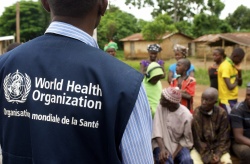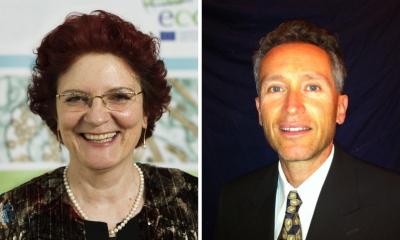Deadly virus seemingly unstoppable
Experts criticize authorities
Fever, vomiting, internal and external bleeding – these are the symptoms of the Ebola virus infection. The current epidemic in Guinea, Liberia and Sierra Leone is the largest recorded Ebola outbreak ever and a serious challenge for the healthcare institutions worldwide.

When Dr Margaret Chan, WHO Director-General declared the current Ebola outbreak a Public Health Emergency of International Concern in August she also asked the international community to do more to contain the disease in West Africa, to contribute “money, medication, medical facilities and medical personnel”. Chan warned that the Ebola virus might spread globally – a scenario which does require a coordinated response by many countries. According to WHO estimates the number of infected persons may well reach 20,000 by November.
The fact that the UN Security Council convened an emergency session bears witness to the fact that the situation is indeed considered serious: This was – after HIV/AIDS in 2000 – only the second time the Security Council has dealt with a health emergency.
“The Ebola epidemic in West Africa has the potential to alter history as much as any plague has ever done,”1 says Michael Osterholm, Director of the Center for Infectious Disease Research and Policy at the University of Minnesota, in the New York Times. Richard Besser, former Director of the US Centers for Disease Control (CDC), agrees and adds in the Washington Post: “I never witnessed an outbreak as disturbing as this one. […] We underestimated this epidemic, and the people of West Africa are paying for it. We know how to control Ebola. It’s time to step up and get the job done.”2
But what happened since Chan declared the International Health Emergency in August? Not enough, if you believe Jim Yong Kim, president of the World Bank: “We were tested by Ebola and we failed. We failed miserably in our response.” He expresses further concerns: “This was sloppy work on even a slow-moving virus like Ebola. If we have seen this with a slow moving virus we are not even close to being ready to deal with a fast moving virus.”3
The epidemic is spreading quickly
The physicians are facing considerable difficulties in trying to contain the virus. The measures that were successful in the past – isolation, treating the infected persons and monitoring the people who had direct contact with infected persons – do not seem to take hold this time. According to Professor Dr Stephan Günther, Director of the Department of Virology at the Bernhard Nocht Institute for Tropical Medicine (BNITM), this is partially due to the fact that the outbreak started in remote areas that are difficult to reach. To make things worse, Günther adds, the infection was not contained but spread to the capital cities. The mobility of the infected persons – the epicentre of the outbreak is a tri-state area of the affected countries – facilitates the virus spreading over large regions and makes recording and monitoring the patients extremely difficult.
The public health systems of the affected countries are simply overwhelmed by the epidemic, Brownie Samukai, Liberian Minister of National Defense, told the UN Security Council and added that his country lacks the infrastructure, logistical capacity, professional expertise and financial resources to effectively address this disease.
Local traditions impede the fight against the virus
It is above all the lack of knowledge about infectious diseases and of hygiene measures, Dr Günther explains, that thwarts many attempts to contain the Ebola virus, but mistrust toward Western medical staff and their hygiene measures also play a crucial role. Many local people consider Ebola “a curse rather than a serious disease and refuse to cooperate with the physicians.” The patients are then cared for by their families at home and if they die they are buried according to the local rites. This is a fatal decision because only strictest quarantine can break the chain of infection and stop the virus from spreading.
Thus it is crucial, Professor Dr Jonas Schmidt-Chanasit, Head of the Virological Central Diagnostics Department at BNITM, explains, to offer culturally sensitive health education in close cooperation with anthropologists. He suggests that international organisations work with trained local personnel who are able to communicate the measures necessary to contain the disease. “We have to explain to the local communities that the Ebola virus was neither imported nor is it being spread by the international aid teams but that the virus is endemic,” the virologist says. Moreover, the locals have to understand that in the case of Ebola traditional healers will not be able to help but every person who is suspected of carrying the virus must attend a hospital with intensive care facilities. In this highly sensitive context the attempt to help can be as fatal as the diseases itself: in a village in Guinea physicians and healthcare workers were killed on a mission.
Currently neither approved antiviral drugs nor vaccines are available to treat people or to protect them from the deadly virus. WHO experts have reviewed new vaccines and pharmaceuticals whose efficacy however has not yet been tested in humans. Some epidemiologists disapprove of the WHO idea to use experimental drugs. “We know nothing about possible and possibly fatal adverse effects for humans,” Professor Schmidt-Chanasit warns and demands more tests instead: “Some problems might be solved by simply adjusting dose. However, we will only be able to recognize such solutions when the drugs are clinically tested. In the current emergency I consider human tests ill-advised.”
PROFILE:
Professor Dr Stephan Günther studied medicine at Charité (Humboldt University Berlin). He obtained his doctorate at the Charité Institute of Virology, followed by his habilitation in 2003 at the University Hospital Hamburg-Eppendorf.
In 1998 he joined the Bernhard Nocht Institute for Tropical Medicine (BNITM) where he has been heading the Department of Virology since 2006. His research focuses on tropical and “emerging viruses” , particularly the Lassa virus.
In 2005 he and Professor Christian Drosten were awarded the Order of Merit of the Federal Republic of Germany for identifying the SARS virus and designing a diagnostic test.
Professor Dr Jonas Schmidt-Chanasit studied medicine at Charité (Humboldt University Berlin) where he also obtained his doctorate. In 2010 he obtained his habilitation in virology at Johann Wolfgang Goethe University, Frankfurt am Main.
From 2006 to 2007 he was Junior Researcher at the Institute of Medical Virology in Frankfurt am Main. He then joined the Bernhard Nocht Institute for Tropical Medicine (BNITM) in Hamburg, where he heads the Virological Central Diagnostics Department. He also is Deputy Head of the Department of Virology.
1. Osterholm, Michael: What We’re Afraid to Say About Ebola, http://www.nytimes.com/2014/09/12/opinion/what-were-afraid-to-say-about-ebola.html?_r=0.
2. Besser, Richard: The world yawns as Ebola takes hold in West Africa, http://www.washingtonpost.com/opinions/as-ebola-takes-hold-in-west-africa-the-world-yawns/2014/09/11/e4fbfcea-38e1-11e4-bdfb-de4104544a37_story.html.
3. Jim Yong Kim: Ebola crisis: global response has ‘failed miserably’, says World Bank chief, http://www.theguardian.com/world/2014/oct/08/ebola-crisis-world-bank-president-jim-kim-failure.
30.10.2014







